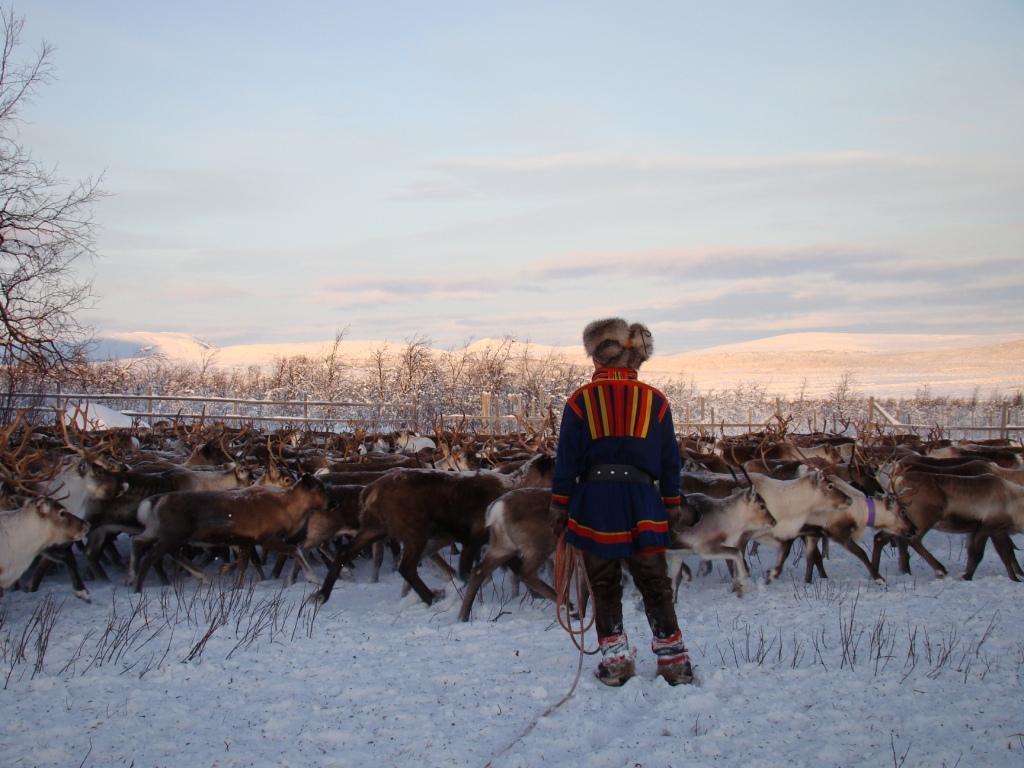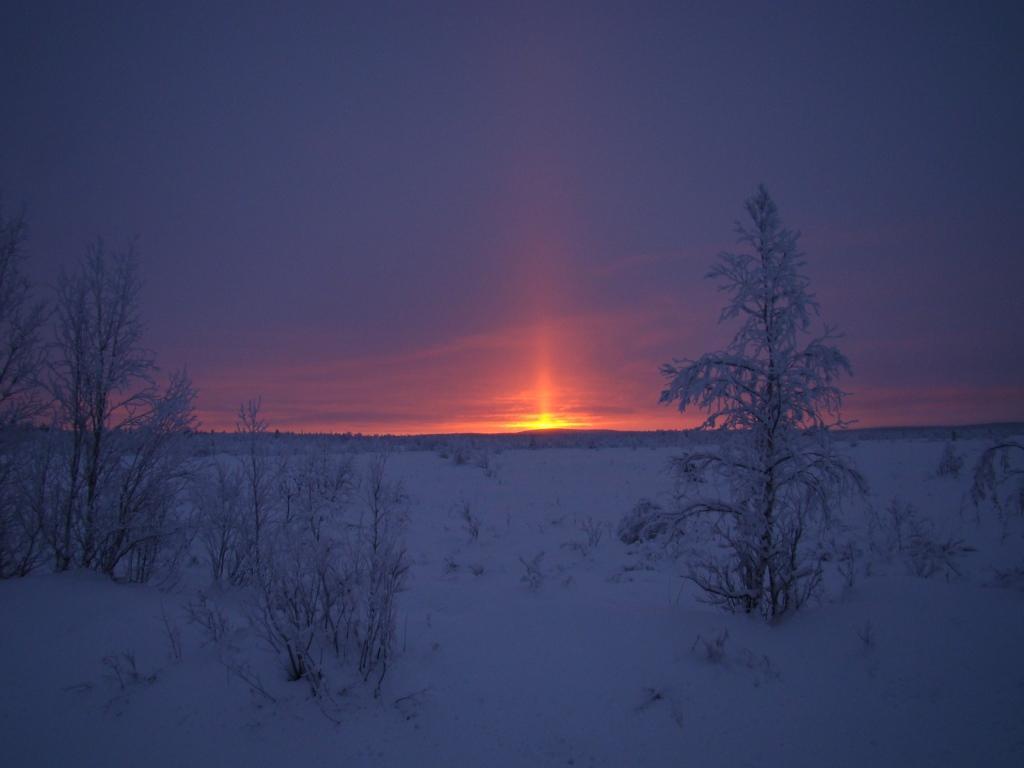Suena como una locura, pero ella está muy feliz con su aventura y ha escrito un artículo que comparto con vosotros. Eso sí, en inglés.
Swedish Lapland : Sami-people, reindeers and the true outdoor wilderness…
By Marie Lambert
Christmas is coming, as well as Santa Claus with his reindeer Rudolf, far from Lapland with presents in his sledge. But, what really happens 250 km above the Arctic Circle? I will tell you. There happens not that much. Yes, there are people living there, but not that many. Yes, there are also periods of no-snow. And yes, sometimes there are also plus degrees. I experience this outdoor wilderness for almost 2 months now, and I can’t get enough from all the treasures this place has to offer! The wide white wilderness with free grazing reindeer.
Together with my boyfriend Jelle, we started a 1-year trip 4 months ago in Göteborg, the south of Sweden. The goal is to see Sweden, Finland, Norway and Iceland through different eyes than the casual way. We travel mostly by hick-hiking, we use the couchsurfing-network to find a sofa to sleep at night, and we search for interesting farms through the WWOOF and HELPX-network. Online they provide both a database where you can find organic farms or other interesting places where you can work as volunteers and help in return for accommodation and food. Indeed, a new way of sustainable tourism is in use already by a lot of people! In the end you get contact from contacts, and with us it ended up in discovering a totally new world: that of the Sami-people with their close relation to nature, in struggle with the contemporary society, reigned by the Swedish government.
Sami, what?
At the moment we stay at the place of a Sami-couple, Britt-Marie and Per-Nils, that live in the small village of Övre Soppero (220 inhabitants in 2005) where 95 percent of the people are Sami. It’s situated in the far North East of Sweden, close to the Finnish border. You probably ask yourself. What is this Sami all about? Well, Sami people of arctic Europe lived and worked in an area that stretches over the regions now known as Norway, Sweden, Finland and the Russian Kola Peninsula. They have inhabited the northern arctic for at least 5000 years and are considered as an indigenous people of the area. Their best known means of livelihood is semi-nomadic reindeer husbandry, what is still the preoccupation from most of the Sami-families in the village here. Reindeer are raised for their meat, hides, antlers and in the old times also for transportation. They generally roam free on pasture grounds. In traditional nomadic Sami herding, reindeer herders migrate with their herds between coast and inland areas according to an annual migration route. Nowadays Sami –people live in a normal house and have cabins up in the mountains in the periods of the year they follow their herds. Every family has a herd of reindeer, what they gather together in the autumn, this time of the year.
So, as a part of our alternative way of travelling, we ended up at the farm of Britt-Marie and Per-Nils. They guide people through the whole history of the Sami-culture and provide accommodation and outdoor activities. (See their website below). Jelle and me take care of the snow shoveling, the pile of wood, the feeding of the sledding dogs, the reindeers and the horses. And Also we took part of this whole reindeer gathering and got to know the Sami-culture in modern times!

The story from the family of Rudolf, the red-nose reindeer!
On the snow scooter we reach the mountains , where the reindeer are gathered together. A big herd. 5000 reindeer. Amazing view. As in autumn the sun only shortly wakes up, we have to be ready for the darkness. The reindeer are pushed to the big wooden fence in the shape of a circle, down the mountain, at the mountain village of Järämä. This Reindeer Coral is equipped with electric light, so the separation of the reindeer can go on the whole day and night. The big reindeer herd has to be divided in a smaller herd, before the smaller separation per family can begin. Ones the smaller reindeer herd is inside the smaller circle-shaped fence, the searching for the marked reindeer can begin. Every family has his own reindeer that is marked at the ears. Difficult to see, but the Sami people can see their marks exactly! Jelle and me just wait till our foster father tells us which reindeer can be taken. Not that easy, as the herd of reindeer are constantly running clockwise from. If they run clockwise they are in panic! So, you walk between the reindeer and try to catch one with the lasso or with your hands at the antlers. Difficult to hold, as this animal has a lot of power! Immediately you go in the direction of the fence where ‘our family’ has their reindeer walking around. This is also the place where there is a camp fire and some cosy seats with reindeer skin. It’s cold, of course. But having enough layers of cloths and running after the reindeer, makes the cold bearable… Slaughtering a reindeer can happen, but is only allowed for own purposes, not for selling. At 2 o’clock in the night we get home after a hard day work. This was a day in a lifetime!
A true natural spirit
But Sami-people have so much more to offer. Their culture with traditional handicrafts (especially wood and horn carved knives!) their survival skills in nature, their religion. Too much to talk about. I would suggest that you just come to live in between those people. Not that they must be seen as a touristic attraction, because you’ll see: they are just people like you and me that have a washing machine and heat hot chocolate in the microwave! But they are unique is this way: they have a very strong peaceful spirit that can be seen on their face and through their gestures that are speaking more than the mouth could tell about. Something that goes beyond the visible world. Something that can’t be seen in this world where the connection with nature is lost. Here, in this peaceful white mountain landscape, the human being didn’t waste the treasures you can find all around. The water is still clean, the air is still breathable, and the soil is still fertile (if it’s not covered with snow of course). A place where silence is usual, mobile-connection is far away found, and you have to deal with the nature itself. The colors what the sun can bring, the white snow that covers all you can see, and the desolated landscapes where your traces in the snow will disappear in the upcoming spring. Everything fades away. Everything.

Links:

